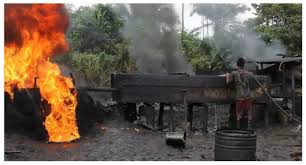The Nigerian Air Force (NAF) has destroyed more than 100 illegal crude oil refining sites in the Niger Delta region between January and May 2025. This action is part of a renewed and intensified crackdown on oil theft, environmental pollution, and economic sabotage in the oil-rich region.
The operations were carried out under Operation DELTA SAFE (OPDS), a joint military task force set up to protect Nigeria’s oil and gas infrastructure, tackle illegal oil bunkering, and restore stability to the Niger Delta. The Air Component of OPDS, which is under the 115 Special Operations Group (115 SOG), has been spearheading these airstrikes and surveillance missions.
In a statement released by the Director of Public Relations and Information of the Nigerian Air Force, Air Vice Marshal Edward Gabkwet (previously represented in statements by Group Captain Ehimen Ejodame), the Air Component of OPDS carried out over 173 missions and 265 sorties across the affected states, flying for about 270 hours during joint and independent operations.
The affected states include Rivers, Bayelsa, Delta, Edo, Ondo, Akwa Ibom, and Cross River. The missions targeted key locations where illegal refining and oil bunkering activities have been rampant. These include Buguma, Okrika, Port Harcourt, Imo River, Egbema/Ohaji, and the Trans Niger Pipeline Right of Way.
According to the NAF, more than 100 illegal refining sites were destroyed during these airstrikes. In addition, 53 wooden boats used in transporting stolen crude oil, 74 cooking tanks, two crude oil reservoirs, and several vehicles used by oil thieves were also destroyed in the operations.
“These precision airstrikes have dealt a serious blow to the logistics and operations of criminal gangs involved in crude oil theft and illegal refining,” the statement said. “The impact has been significant in reducing the scale of crude oil losses and environmental damage in the Niger Delta.”
The Nigerian Air Force also noted that the success of the missions was due to the use of real-time intelligence, surveillance, and reconnaissance (ISR) capabilities, which helped in locating and tracking the illegal refining camps and storage sites.
Crude oil theft and illegal refining have remained major problems in Nigeria, leading to billions of naira in losses annually. Apart from the economic damage, these illegal activities have contributed to massive environmental pollution, particularly in states like Rivers and Bayelsa, where oil spills and soot pollution continue to affect the health and livelihoods of local communities.
Experts and stakeholders in the oil and gas sector have commended the NAF for its role in the fight against oil bunkering, urging continued collaboration with other security agencies, local communities, and oil companies.
While these recent successes have been praised, many say there is still a need for long-term strategies to tackle the root causes of oil theft, including poverty, unemployment, and corruption. Some community leaders in the affected areas also advocate for the inclusion of youths in legal pipeline surveillance jobs, environmental remediation programmes, and vocational training.
Security analysts believe that the intensified military actions are part of a broader effort by the Federal Government to secure Nigeria’s oil revenue, especially as the country continues to face economic pressure from fluctuating global oil prices and foreign exchange challenges.
As the Nigerian Air Force continues its operations in the region, there are expectations that the crackdown on oil theft will lead to improved oil production, cleaner environments, and safer communities. However, many say that for lasting peace and stability in the Niger Delta, the military approach must be combined with community engagement, justice, and inclusive development.
The fight against crude oil theft remains a critical part of Nigeria’s national security and economic recovery efforts. The Nigerian Air Force has assured the public that it remains committed to its mandate of protecting the country’s resources and will sustain its operations until criminal networks are completely dismantled.
